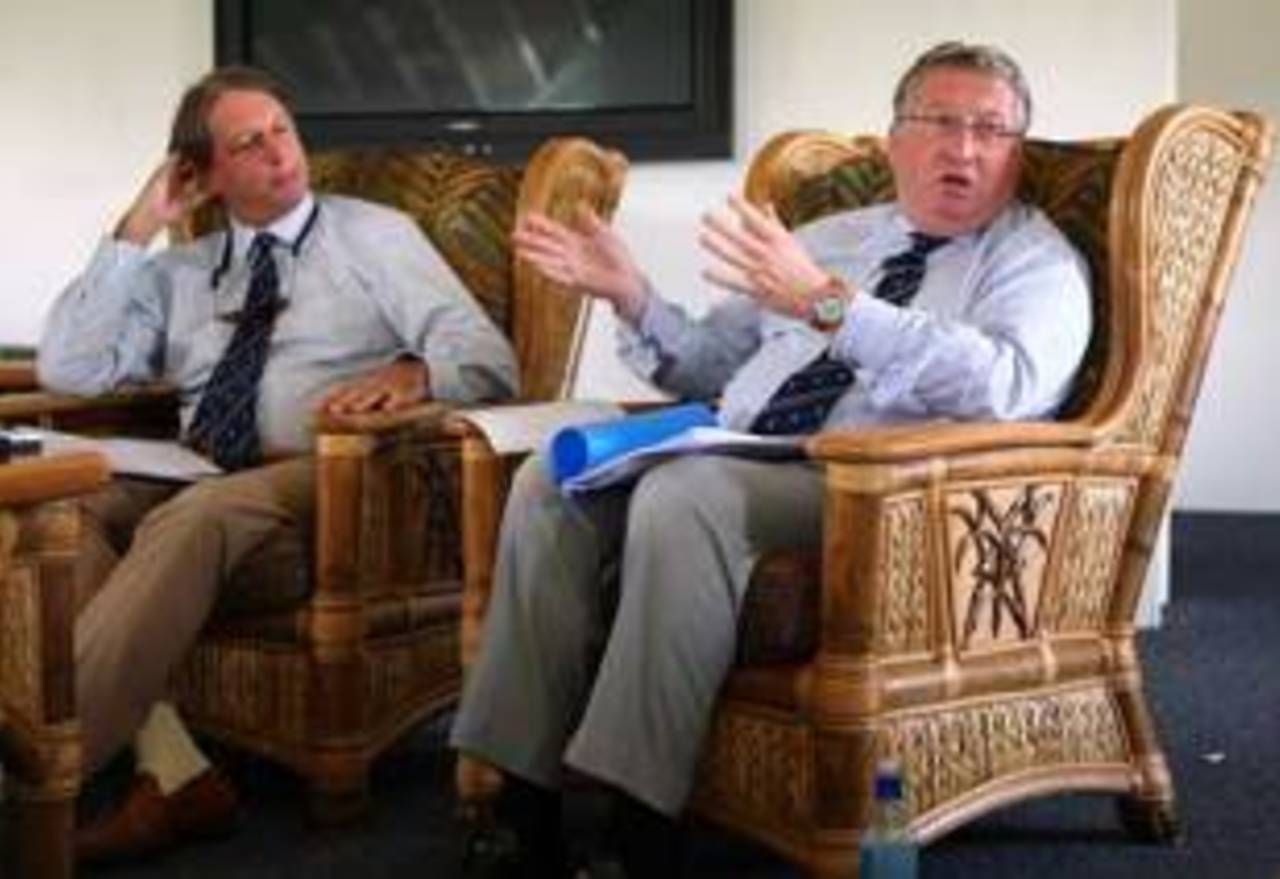England's loss, Modi's gain
The ECB has not turned Twenty20, its big idea, into big bucks
Richard Gillis
13-Apr-2009

Clarke and Collier have slicked up the ECB, but they've been timid when it comes to Twenty20 • Getty Images
Matti Makkonen is a shy former mobile telecom engineer from Finland, who in appearance could be a geography teacher - tweed jacket, friendly smile, and no doubt, a bag of boiled sweets tucked away in his coat pocket. His contribution to the world is the SMS (text) message. These days he is introduced to audiences as "The Father of Text Messaging", and he recently picked up a lifetime achievement award from the Economist. His story is unusual in that it took 18 years for Makkonen's contribution to be recognised - the Eureka moment took place in a Copenhagen pizza parlour in 1984 - a period in which text messaging grew to become a central part of modern life, not to mention an industry worth tens of billions of pounds.
Makkonen is lucky to be recognised at all: history shows we credit the wrong people for some of the great innovations of our time. Thomas Edison did not invent the lightbulb; he was rather the first to bring it to public attention. Likewise, Henry Ford did not make the first car, but he had the marketing power to get the
message out. Elisha Gray would be a great deal more famous had Alexander Graham Bell not given a
headline-grabbing presentation of his telephone at the World's Fair in Philadelphia in 1876; Gray patented
his own telephone the previous year, on the same day as Bell.
In years to come cricket historians may come to forget the names of Stuart Robertson or John Carr, two ECB officials who have both been credited at various times with the "invention" of Twenty20. But Lalit Modi? His
place as cricket's great innovator is secure: fame and fortune tend not to go to the people who come up
with the idea but to the risk-takers who turn the idea into money. By contrast, timidity has defined the
ECB's approach.
It is now six years since the ECB launched Twenty20 to an appreciative audience, four-and-a-half years before the first World Twenty20 (in South Africa in 2007) and five years before the inaugural IPL. In 2004 26,500 people crammed into Lord's on a balmy summer evening to watch a Middlesex v Surrey match, the
first sell-out of a (non-final) county game at headquarters since 1953.
Rather than act then to create the English Premier League, the ECB stalled, wasting valuable time commissioning a market-research report, the findings of which told the board what it already knew:
people want more Twenty20. It was during this time that another decision was made, which continues to have huge effects on English cricket and that led ultimately to the Stanford debacle.
Rather than act five years ago to create the English Premier League, the ECB stalled, wasting valuable time commissioning a market-research report, the findings of which told the board what it already knew:
Keen to add value to its TV deal with Sky in 2005, the ECB chose to bundle the television rights to the Twenty20 Cup into the rest of its inventory of domestic Test matches, ODIs and county games
- all of which was bought by Sky for £300m.
This was the stick-or-twist moment, and again the ECB chose the safe option. The received wisdom back in 2005 was that Sky was paying for the Tests and ODIs with county cricket, the audience for which is relatively small, the makeweight in the deal. Now, in a post-IPL world, those value judgments have shifted. Rather
than create a whole new revenue stream for English cricket by selling Twenty20 separately, Sky effectively
got Twenty20 for free. Years later, when Allen Stanford came calling, the ECB saw his millions as a way of
filling that hole.
Compare this approach with that of the ECB's Indian counterpart. Lalit Modi has taken the innovation and turned it into a multi-billion dollar industry. At the key moments Modi has taken a risk and been
rewarded, which in essence is the role of the entrepreneur. For the IPL to become reality Modi used the BCCI's money to underwrite the acquisition of the world's top 50 non-Indian cricketers, a bold move
that guaranteed the players a minimum of US$200,000 per season for three years - a total of $30m underwritten.
He was then able to go to broadcasters with an exciting new product, for which Sony Entertainment Television paid $1.3bn. Much has changed since Twenty20 was launched in England in 2003. Boom has turned to bust and the downturn has made the selling of the ECB's English Premier League, or P20 as it is now being called, more challenging. This latest incarnation - 18 teams, two leagues - is itself a fudge,
less compelling than the Keith Bradshaw-David Stewart proposal of city-based franchises, and strangely, less fun than the current Twenty20 Cup, which as a "product" has been a popular and distinctive addition to the county season.
The story of Twenty20 will define the Giles Clarke and David Collier era, who as chairman and chief executive of the ECB respectively, were charged with making English cricket more business-like. Certainly their legacy is a more corporate organisation - swish offices, legions of corporate-communications officers,
marketing five-year plans, new logos, new kit deals and so on. But these are ornaments. When it came to the real stuff, applying the skill of the entrepreneur in turning a great idea into money for its stakeholders, the ECB's men in suits have been found wanting.
Richard Gillis an award-winning sports-business journalist. This article was first published in the April 2009 issue of the Wisden Cricketer. Subscribe here